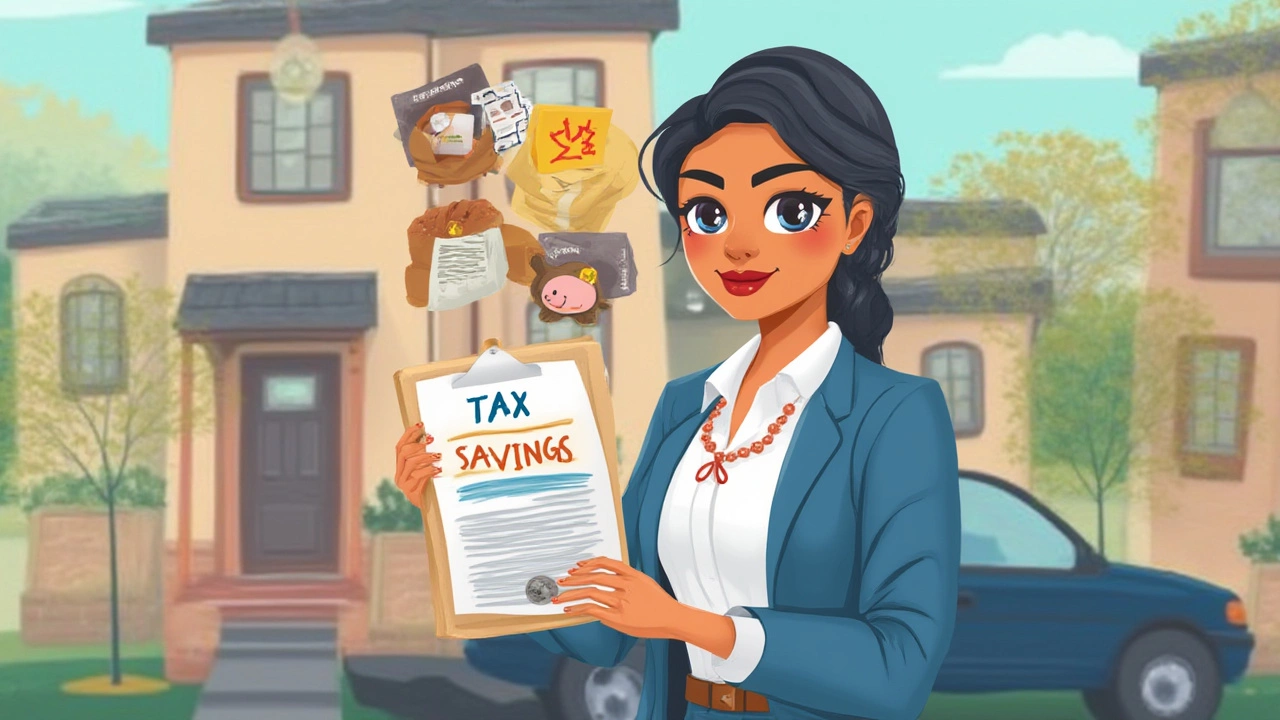Think taxes are all about real estate? Not in Virginia. Here, your car can cost you almost as much in taxes as your house does in some states. Folks are often caught by surprise—one minute you’re driving off the lot with a used sedan, the next, there’s a tax bill in your mailbox. Personal property tax is a staple of life for Virginians, hitting vehicles, certain business equipment, and even trailers. Knowing what’s actually taxed and what slips under the radar can save you time, money, and stress.
What Counts as Personal Property in Virginia?
Everyone throws around the term "personal property,” but what gets a taxman’s attention in Virginia isn’t your couch or your fridge. Here, personal property mostly means tangible items that can move. If it rolls, floats, or is tied to your business, it might be fair game.
The biggest target? Vehicles. Passenger cars, trucks, and motorcycles are all up for annual property tax. Got a camper van or a boat trailer? They want a piece of that too. Boats themselves—yep, those are included, and even jet skis in many counties. Businesses don’t get off easy: equipment, machinery, leased items, and computer servers can all trigger yearly tax bills.
Collectible cars and antiques get their own quirky set of rules, with some assessed for less if they’re rarely driven. This means the 1967 Mustang that only leaves the garage for parades is a different beast from your daily commuter. Some places even tax farm equipment or mobile homes as personal property.
If you’re only in Virginia part-time? That can get complicated. "Domicile" rules determine where your stuff gets taxed, especially for students, military personnel, or snowbirds. Register your car in Virginia and—snap—you’re on the tax rolls. Forgetting means steep penalties or getting stopped at inspection time.
How Is Virginia Personal Property Tax Calculated?
Here’s where things get real. Virginia doesn’t have one statewide rate, so whether you live in Fairfax County or Gloucester, your bill can look way different for the same ride. Counties and cities set their own rates and sometimes even treat property classes differently. The main factor: assessed value, not what you paid for your car but what the county thinks it’s worth as of January 1 each year.
Don’t expect to argue your way into a lowball number, either. Local assessors use the NADA guide or blue-book style pricing to set your car’s taxable value. It doesn’t matter if you scored a deal or your 2018 SUV’s got three dings; they go off unfriendly averages. Then, the tax rate—which can be anything from $2.45 per $100 of assessed value to over $4 per $100—gets applied. That's not chump change once you add up a few assets.
Virginia gives you one lifeline: the Personal Property Tax Relief Act (PPTRA), which covers part of the tab for vehicles used for personal—not business—use and is under 7,501 lbs. The relief varies with state budget shuffling and local decisions, but it’s often around 30% of the bill for cars valued under $20,000. No shopping for a cheap hybrid just to avoid taxes—PPTRA only goes so far.
| County/City | Rate Per $100 Assessed Value | Common Taxed Items |
|---|---|---|
| Fairfax | $4.57 | Cars, trucks, motorcycles, trailers, business equipment |
| Arlington | $5.00 | Cars, motorcycles, boats, leased vehicles |
| Virginia Beach | $4.00 | Cars, motorcycles, boats |
| Richmond City | $3.70 | Vehicles, mobile homes, business property |
| Prince William | $3.70 | Autos, trucks, motorcycles, mobile homes |
So, the real question: how much will you pay? A $20,000 sedan in Fairfax could cost $914 before any relief. In a cheaper county, maybe $500. You can appeal your assessment, but don’t count on miracles without documentation showing clear error (like, say, your car met a tree last year).

Who Actually Has to Pay—and When?
If your name is on the title, you’re on the hook. Register your car with the Virginia DMV, and they automatically report your info to local tax authorities. Most localities have their own deadlines—many expect payment by October 5 for the year, but, again, you’re at the mercy of your particular town or county.
Miss a payment and the late fees stack up fast. You may also get a hold slapped on your vehicle registration renewal, which can be a real hassle next time you try to drive legally. Business owners face tighter timelines and more complex reporting: most must file an annual return listing all equipment, vehicles, and leased property used for the company. Mess that up and there’s interest plus penalties, sometimes reaching 10% or more.
Don’t think you can skate by because you’re in the military or a student from out-of-state. Most active-duty military are exempt (if their car’s registered elsewhere), but not their non-military spouse unless certain residency rules apply. College students often get tangled in "domicile" paperwork—registering in another state but living in Virginia during school can still mean a tax bill if you keep your car there. Not fun arguing that one over the phone with the county clerk.
There are also exemptions for some disabled veterans (up to one vehicle, full exemption if the vet meets defined criteria). Some localities offer tiny breaks for elderly or low-income owners, but they’re not standard and require a separate application. Keep every letter that arrives about your taxes—some notices look like spam but contain essential info or barcoded coupons needed to pay.
Personal Property Tax Isn’t Just for Cars—What Else Gets Hit?
Vehicles steal the spotlight, but personal property tax creeps further. Boats, personal aircraft (think hobbyist Cessnas), trailers, camper vans, and mobile homes counted as "non-permanent" also get taxed. For businesses? Desks, computers, CNC machines, even office chairs may trigger annual tax reporting and bills, depending on locality rules.
Boats face a mixed bag—some places cut boat owners slack, using lower rates or giving "boat tax holiday" periods, while others tax luxury yachts at high rates. Jet ski and wave runner tax rates can be separate. And if you own a mobile home? Whether the tax lands with the real estate or personal property rolls depends on whether the home is permanently set on land you own or still mobile. Sounds simple, but it’s not—counties differ like night and day here.
Certain property is totally exempt. Clothing, furniture, and household appliances (unless you’re renting out the property as a furnished Airbnb) dodge the tax, as does farm equipment in many counties. Check your specific locality’s list; some small towns love to tax oddball items while their neighbors skip them. Don’t guess—one phone call to your county treasurer can save a headache.
- Vehicles (cars, trucks, motorcycles, trailers, some RVs)
- Boats and watercraft
- Business equipment, machinery, and leased items
- Non-permanent/mobile homes (where applicable)
- Some airplanes
Business owners, in particular, get tripped up—forgetting to file can trigger big fees, extra paperwork, and, in extreme cases, tax liens. Each county posts a list of what’s taxed and what isn’t every January, but good luck finding one that’s short or easy to read. Spend an hour with this list if you’re setting up shop in Virginia.

Tips and Strategies for Cutting Down Your Tax Bill
The sticker shock makes Virginians creative. Start by checking the value the county pinned on your vehicle—did they include high-end trims or options your car doesn’t have? Any mistake there is fair game for an appeal, and you’ll need photos or a dealer quote to back it up. If you sold or junked your car mid-year, file a report right away—getting off the rolls early usually stops future tax.
Look for local "personal property tax relief" programs. The state-wide PPTRA is standard, but some towns throw in their own deals, especially for vehicles used mostly for commuting or registered to seniors. Keep records of mileage and proof a car is "stored, rarely used," as some localities offer a reduced rate for that, especially with collectibles.
If you’re new in town, register your car right away. Waiting can trigger late penalties and, ironically, a higher tax if the value guide jumps between model years. Business owners: depreciate your listed equipment carefully. Some places allow a sliding scale where older computers get a lower assessment every year.
When debating between owning and leasing, remember: leased vehicles are still taxed, usually with the lessee as the responsible payer. Factor this into your monthly costs to avoid nasty surprises.
- Always update your address to the DMV as soon as you move; some folks pay double tax by accident if two counties copy your records.
- Appeal unfair assessments quickly—most allow appeals within 30 days of notice.
- Military members: bring your active-duty orders and non-resident paperwork to the local tax office if you get an erroneous bill.
- Business owners: use a property tax consultant if your inventory is big or complicated.
It all comes down to vigilance. Virginia’s personal property tax is quirky, often expensive, but not impossible to manage. Get to know your county’s rules, ask questions, and don’t ignore those annual assessment notices. That can be the one thing standing between you and a courthouse drama starring your car as the main character.

